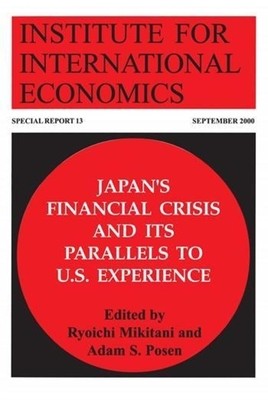
- We will send in 10–14 business days.
- Publisher: Peterson Institute for International Economics
- ISBN-10: 088132289X
- ISBN-13: 9780881322897
- Format: 15.2 x 22.9 x 1.4 cm, minkšti viršeliai
- Language: English
- SAVE -10% with code: EXTRA
Japan's Financial Crisis and Its Parallels to U.S. Experience (e-book) (used book) | bookbook.eu
Reviews
Description
Japan is only one of many industrialized economies to suffer a financial crisis in the last fifteen years, but it has suffered the most from its crisis - as measured in lost output and investment opportunities, and in the direct costs of clean-up. Comparing the response of Japanese policy in the 1990s to that of U.S. monetary and financial policy to the American Savings and Loan Crisis of the late 1980s sheds light on the reasons for this outcome. This volume was created by bringing together several leading academics from the United States and Japan - plus former senior policymakers from both countries - to discuss the challenges to Japanese financial and monetary policy in the 1990s. The papers address in turn both the monetary and financial aspects of the crisis, and the discussants bring together broad themes across the two countries' experiences. As the papers in this Special Report demonstrate, while the Japanese government's policy response to its banking crisis in the 1990s was slow in comparison to that of the United States government a decade earlier, the underlying dynamics were similar. A combination of mismanaged partial deregulation and regulatory forebearance gave rise to the crisis and allowed it to deepen, and only the closure of some banks and injection of new capital into others began the resolution. The Bank of Japan's monetary policy from the late 1980s onwards, however, was increasingly out of step with U.S. or other developed country norms. In particular, the Bank of Japan's limited response to deflation after being granted independence in 1998 stands out as a dangerous and unusual stance.
EXTRA 10 % discount with code: EXTRA
The promotion ends in 21d.08:43:25
The discount code is valid when purchasing from 10 €. Discounts do not stack.
- Publisher: Peterson Institute for International Economics
- ISBN-10: 088132289X
- ISBN-13: 9780881322897
- Format: 15.2 x 22.9 x 1.4 cm, minkšti viršeliai
- Language: English English
Japan is only one of many industrialized economies to suffer a financial crisis in the last fifteen years, but it has suffered the most from its crisis - as measured in lost output and investment opportunities, and in the direct costs of clean-up. Comparing the response of Japanese policy in the 1990s to that of U.S. monetary and financial policy to the American Savings and Loan Crisis of the late 1980s sheds light on the reasons for this outcome. This volume was created by bringing together several leading academics from the United States and Japan - plus former senior policymakers from both countries - to discuss the challenges to Japanese financial and monetary policy in the 1990s. The papers address in turn both the monetary and financial aspects of the crisis, and the discussants bring together broad themes across the two countries' experiences. As the papers in this Special Report demonstrate, while the Japanese government's policy response to its banking crisis in the 1990s was slow in comparison to that of the United States government a decade earlier, the underlying dynamics were similar. A combination of mismanaged partial deregulation and regulatory forebearance gave rise to the crisis and allowed it to deepen, and only the closure of some banks and injection of new capital into others began the resolution. The Bank of Japan's monetary policy from the late 1980s onwards, however, was increasingly out of step with U.S. or other developed country norms. In particular, the Bank of Japan's limited response to deflation after being granted independence in 1998 stands out as a dangerous and unusual stance.


Reviews